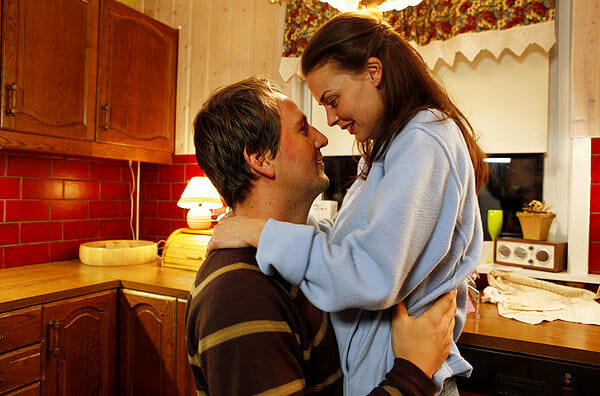
If two unhappy couples are isolated together in a film, it can be pretty much assumed that at least one affair will be the result. That’s certainly the case in Happy, Happy, a Norwegian feature with a laser-focus on the clash between two young families that have been quietly falling apart. Of course most stories have been told before countless times; the question at hand is whether Happy, Happy succeeds in drawing out new observations. And while there are plenty of recognizable moments here, the film isn’t an exercise in melodrama, instead it’s an almost existential search for why these people are hurting each other.
It’s good that there are deeper concerns, because the maneuverings of these two couples are obvious almost from the moment we meet them: The first is a merry middle school teacher with her recalcitrant husband, the second an equally cheerful husband and his stoic wife who we soon learn cheated on him. The two more outgoing members of the couples begin sleeping with each other, but the film isn’t particularly about that, it’s far more concerned with why they made this choice when they will certainly be caught; it’s obvious that they’re driven less out of love for each other than for a need to communicate with their spouses. In both cases the couples have stayed together for their children and the sake of personal stability. When one pair is asked what they initially saw for each other, they’re at a complete loss.
This primary story is counterpointed by a small but memorably disturbing subplot between the two couples’ children. One child begins bullying the other due to his lack of connection with his own parents and a need to find a way to take control of his own life. This takes the form of a game he invents: pretending the other child, who is black and adopted, is a slave and he’s his master. Without his own parental guidance to turn to or any positive black role models available, the black child assents and their “games” grow increasingly dark as the film continues.
Happy, Happy is ultimately less about the fraternization between these couples than it is about a crisis in the families. It’s one of relatively few dramas in which the action is in fact too lean, such that every scene is there for thematic and story purposes with an absolute minimum of excess. Usually this would be a blessing, but the film is so engrossing that it could use some more sprawl and mess—it’s one of the tightest stories of family dissolution ever screened. The universally good performances and naturalistic directing are counterbalanced a bit by the screenplay’s exactitude. No family falls apart this neatly, especially no pair of them, but what we see is still powerful and at times difficult to watch in the best possible way.
In less deft hands Happy, Happy would feel calculated and cold. You can see the gears turning in the background, moving characters around with precision for maximal impact. But director Anne Sewitsky has too much compassion for all of her characters, no matter how irredeemable they may at times seem to be, and she’s unwilling to let them be subsumed by the swiftly moving plot. While the film is limited by its ambition and its overall story may not be the most original, Happy, Happy’s mature concern for its characters makes it one of those few films in theaters that are really and truly adult.